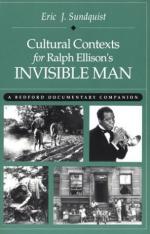|
This section contains 5,360 words (approx. 18 pages at 300 words per page) |

|
SOURCE: "Improvising America: Ralph Ellison and the Paradox of Form," in Speaking for You: The Vision of Ralph Ellison, edited by Kimberly W. Benston, Howard University Press, 1987, pp. 173-83.
In the following essay, Bigsby examines Ellison's paradoxical treatment of chaos and form.
Writing in 1937, Richard Wright insisted that "black writers are being called upon to do no less than create values by which the race is to struggle, live and die" ["Blueprint for Negro Literature," Amistad, Vol. 2, 1971]. In 1941 Ellison echoed this sentiment. His responsibility, he felt, was "to create the consciousness of his oppressed nation" ["Recent Negro Fiction," New Masses, August 5, 1941]. It was a stance he was later to be accused of abandoning by those who, in the 1960s and 1970s, proposed their own prescriptions for cultural and political responsibility and who found his determined pluralism unacceptable. For although he undeniably concentrated on the black experience in America...
|
This section contains 5,360 words (approx. 18 pages at 300 words per page) |

|


